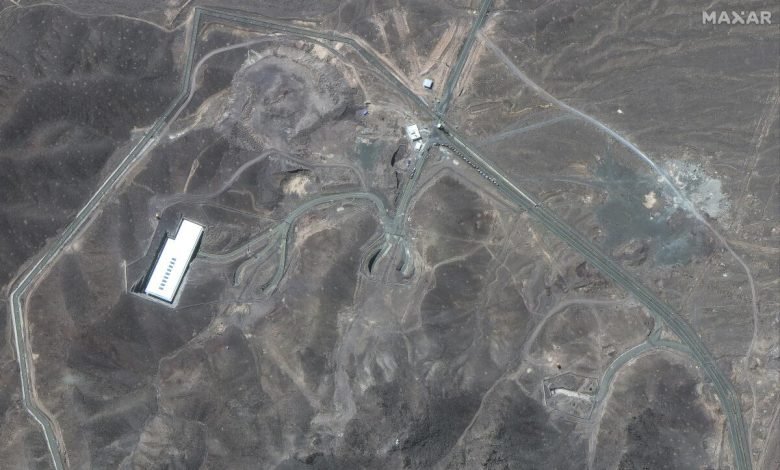
Reuters – Iran and Israel traded air and missile strikes as the world braced on Monday for Tehran’s response to the U.S. attack on its nuclear sites and U.S. President Donald Trump raised the idea of regime change in the Islamic republic.
Iran vowed to defend itself on Sunday, a day after the U.S. joined Israel in the biggest Western military action against the country since its 1979 Islamic Revolution, despite calls for restraint and a return to diplomacy from around the world.
Commercial satellite imagery indicated the U.S. attack on Saturday on Iran’s subterranean Fordow nuclear plant severely damaged or destroyed the deeply buried site and the uranium-enriching centrifuges it housed, but the status of the site remained unconfirmed, experts said.
In his latest social media comments on the U.S. strikes, Trump said “Monumental Damage was done to all Nuclear sites in Iran.”
“The biggest damage took place far below ground level. Bullseye!!!” he wrote on his Truth Social platform.
Trump earlier called on Iran to forgo any retaliation and said the government “must now make peace” or “future attacks would be far greater and a lot easier.”
The U.S. launched 75 precision-guided munitions including bunker-buster bombs and more than two dozen Tomahawk missiles against three Iranian nuclear sites, chairman of the Joint Chiefs of Staff, General Dan Caine, told reporters.
The U.N. nuclear watchdog, the International Atomic Energy Agency, said no increases in off-site radiation levels had been reported after the U.S. strikes. Rafael Grossi, the agency’s director general, told CNN that it was not yet possible to assess the damage done underground.
A senior Iranian source told Reuters that most of the highly enriched uranium at Fordow had been moved elsewhere before the attack. Reuters could not immediately corroborate the claim.
Tehran, which denies its nuclear programme is for anything other than peaceful purposes, sent a volley of missiles at Israel in the aftermath of the U.S. attack, wounding scores of people and destroying buildings in Tel Aviv.
But it had not acted on its main threats of retaliation, to target U.S. bases or choke off oil shipments that pass through the Strait of Hormuz.
Attempting to strangle Gulf oil supply by closing the strait could send global oil prices skyrocketing, derail the world economy and invite conflict with the U.S. Navy’s massive Fifth Fleet based in the Gulf.
Oil prices jumped on Monday to their highest since January. Brent crude futures LCOc1 rose $1.88 or 2.44% at $78.89 a barrel as of 1122 GMT. U.S. West Texas Intermediate crude CLc1 advanced $1.87 or 2.53% at $75.71.
Iran’s parliament has approved a move to close the strait, which Iran shares with Oman and the United Arab Emirates. Iran’s Press TV said closing the strait would require approval from the Supreme National Security Council, a body led by an appointee of Iran’s Supreme Leader Ayatollah Ali Khamenei.
Caine said the U.S. military had increased protection of troops in the region, including in Iraq and Syria. The U.S. State Department issued a security alert for all U.S. citizens abroad, calling on them to “exercise increased caution.”
The United States already has a sizeable force in the Middle East, with nearly 40,000 troops and warships that can shoot down enemy missiles.
The Israeli military reported a missile launch from Iran in the early hours of Monday morning, saying it was intercepted by Israeli defences.
Air raid sirens blared in Tel Aviv and other parts of central Israel. Iran has repeatedly targeted the Greater Tel Aviv – a metropolitan area of around 4 million people – the business and economic hub of Israel where there are also critical military assets.
Iranian news agencies reported air defences were activated in central Tehran districts to counter “enemy targets”, and that Israeli air strikes hit Parchin, the location of a military complex southeast of the capital.
REGIME CHANGE
In a post to the Truth Social platform on Sunday, Trump raised the idea of regime change in Iran.
“It’s not politically correct to use the term, ‘Regime Change,’ but if the current Iranian Regime is unable to MAKE IRAN GREAT AGAIN, why wouldn’t there be a Regime change??? MIGA!!!” he wrote.
Trump’s post came after officials in his administration, including U.S. Vice President JD Vance and Defense Secretary Pete Hegseth, stressed they were not working to overthrow Iran’s government.
Israeli officials, who began the hostilities with a surprise attack on Iran on June 13, have increasingly spoken of their ambition to topple the hardline Shi’ite Muslim clerical establishment.
Iranian Foreign Minister Abbas Araqchi is expected to hold talks with Russian President Vladimir Putin in Moscow on Monday. The Kremlin has a strategic partnership with Iran, but also close links with Israel.
Speaking in Istanbul on Sunday, Araqchi said his country would consider all possible responses and there would be no return to diplomacy until it had retaliated.
Russia’s foreign ministry condemned the U.S. attacks which it said had undermined the Treaty on the Non-Proliferation of Nuclear Weapons.
“The risk of the conflict spreading in the Middle East, which is already gripped by multiple crises, has increased significantly,” it said.
The U.N. Security Council met on Sunday to discuss the U.S. strikes as Russia, China and Pakistan proposed the 15-member body adopt a resolution calling for an immediate and unconditional ceasefire in the Middle East.
U.N. Secretary-General Antonio Guterres told the Security Council the U.S. bombings in Iran marked a perilous turn in the region and urged a return to negotiations over Iran’s nuclear programme.

